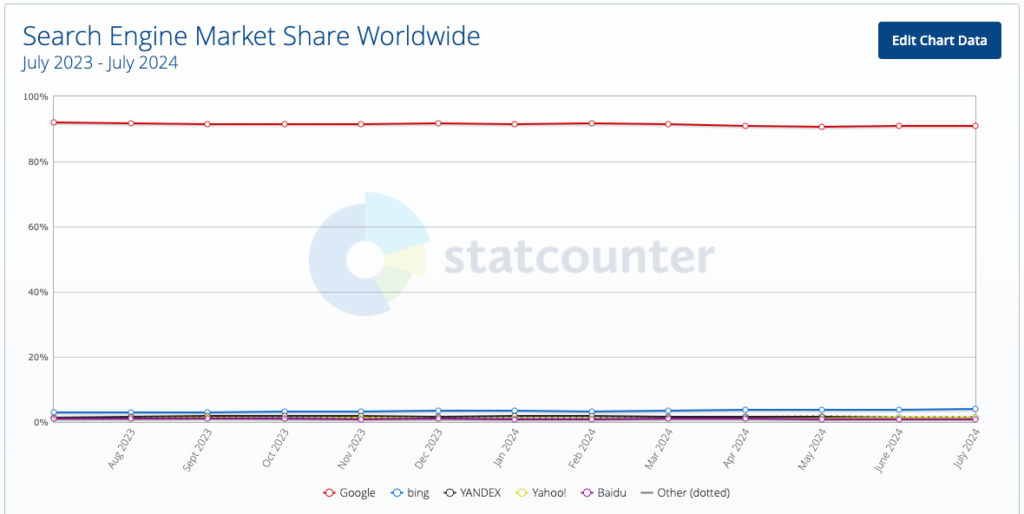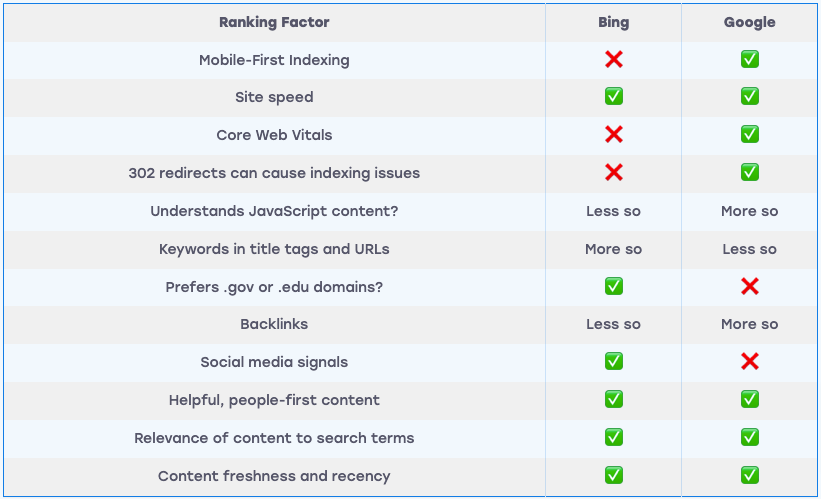Google has long been the force, in the search engine realm holding a share of over 90% in the market. However, Microsoft Bing has emerged as a competitor showcasing a reach that commands attention. When examining these two platforms through an SEO lens it uncovers both similarities and distinctions. It is crucial for SEO professionals and marketing teams to grasp the features of each platform to execute search engine campaigns.
Market Share
For two decades, Google has reigned supreme in the search engine industry by refining its algorithms delivering precise search results and offering user-friendly interfaces. Despite its market share compared to Google, Bing cannot be overlooked. Notably, Microsoft’s Bing powers searches for Yahoo and AOL collectively accounting for 33% of desktop searches in the U.S.

User Demographics
Google typically attracts a tech-savvy audience on a global scale. In contrast, Bing’s strength lies in capturing a demographic within the U.S market. This makes Bing a valuable option for companies targeting specific consumer profiles.
Algorithm Updates
Google’s algorithm changes are well known in the SEO community, with major updates like Panda, Penguin, and Hummingbird causing shifts in search results and affecting websites. The consistent updates ensure that users receive useful information. On the other hand, Bing maintains a stable algorithm that changes less frequently and provides clearer insights into its modifications. To succeed, SEO strategies need to adapt to these characteristics of each platform.
Local Search
Google dominates the search arena with its tools like Google Maps and Google My Business. In comparison, Bing offers a listing service called Bing Places. Both platforms offer opportunities for businesses to enhance their visibility. However, Google’s advanced algorithm, user base, and integration with other platforms create more chances for local businesses to engage with their nearby audience.
Image and Video Searches
In the realm of image and video searches, Bing holds an advantage. Bing’s video search stands out for its user layout that allows for filtering options. Additionally, Bing’s image search provides ways to filter results compared to Google, making it more convenient for users.
Keyword Relevance
Both Google and Bing focus on delivering content based on user intent. However, Google prioritizes domain authority and backlink quality when determining content relevance. On the other hand, Bing focuses more on the relevance of keywords and the age of domains, giving importance to exact match domains and keywords present in the URL.
Integration with Social Media
Bing seamlessly integrates with social media platforms by incorporating Facebook likes into its search results, offering a dimension that is not as prominent in Google’s search results.
Paid Advertising
While Google AdWords continues to dominate the paid advertising landscape, Bing Ads presents itself as an alternative for niches due to lower competition, reduced cost per click, and improved targeting options based on devices and demographics. Advertisers aiming to optimize their advertising budget should consider utilizing both platforms.
Mobile SEO
Google leads in SEO with its emphasis on “”mobile-first”” indexing, encouraging websites to have mobile-friendly versions for better visibility and ranking. In contrast, Bing still leans towards a desktop approach despite moving towards optimization. This underscores the importance for SEO professionals to tailor strategies according to each search engine’s preferences.
Voice Search Optimization
With the rise of voice searches, Google offers tools like Google Assistant, Google Home, and Android devices while Bing supports Amazon’s Alexa and Microsoft’s Cortana. This underlines the significance of optimizing content for bothGoogle and Bing, for businesses seeking to take advantage of voice search trends.
SEO Tools
When it comes to SEO, Google’s Search Console offers in-depth reports and data that can greatly benefit an SEO campaign. On the other hand, Bing’s Webmaster Tools, while not as advanced as Google’s offering, provides data such as detailed reports on crawl errors, inbound link data, and keyword performance.
Loading Speed and Efficiency
Continuing with the discussion on SEO, it’s important to consider how each search engine handles loading speed and efficiency. For example, Google’s AMP (Accelerated Mobile Pages) significantly speeds up load times on devices, leading to an improved user experience and potentially higher rankings on Google’s SERPs. In contrast, Bing does not currently support AMP, giving Google an advantage in this area.
Multimedia Integration
However, Bing excels in multimedia integration, by supporting multimedia formats for its SERP features. This could mean that using Bing may help businesses reach an audience who prefer consuming content through videos and images.
Security Concerns
In terms of security concerns, Google gives preference to HTTPS websites as a signal. Bing considers website security as a factor but does not show a strong preference for HTTPS over HTTP.
Search Engine Results Page (SERP) User Experience
The SERP, which is the final display users see after entering a search query, differs between Google and Bing. Google focuses on simplicity and clean design to enhance user experience. It typically includes paid listings results, snippets, images, and local maps based on the search query. On the other hand, Bing’s SERPs are visually captivating with designs and a significant emphasis on social media integration. One unique feature of Bing is that it displays a bio of celebrities when their names are searched. Additionally, Bing tends to show more advertisements in its search results compared to Google.
Differences in Handling SEO Factors Between Google and Bing
Google and Bing have different approaches to essential SEO factors that impact overall SEO strategies:
- Bing gives more importance to meta descriptions than Google does. While Google often generates its snippets based on user queries, Bing tends to use the meta description provided.
- When it comes to backlinks, both Google and Bing view them as crucial for SEO. However, Google values the quality of links more while Bing focuses on the quantity of backlinks.
- Bing gives weightage by considering signals from platforms like Facebook and Twitter in its ranking algorithm. On the other hand, Google has clarified that it doesn’t directly use social media signals in its ranking criteria.

SEO Tools Available
As for SEO tools available, Google provides a range of tools like Google Analytics, Search Console, Insights, Trends, and Keyword Planner which are essential for SEO professionals. These tools offer insights into website performance, audience behavior, keyword analysis, and trending topics. On the other hand, Bing’s counterpart, Bing Webmaster Tools, though not extensiveas Google’s suite of tools, offers unique data especially in social media analytics, keyword research, and website diagnostics. One notable feature of Bing is its SEO Analyzer, which swiftly reviews website pages and offers suggestions on how to enhance their SEO.
Conclusion
In summary, Google and Microsoft Bing offer advantages and drawbacks for SEO specialists. Google’s innovative approach driven by users and dominant market position make it a crucial platform for SEO endeavors. On the other hand, Microsoft Bing’s unique demographic reach, integration with media, and less saturated market provide a valuable alternative that can complement and boost SEO strategies. Although Google maintains its lead in the search engine realm, Bing’s steady growth and distinctive features demand attention. In an evolving landscape, adopting a diversified SEO approach that utilizes both search engines could be the optimal path forward.”

